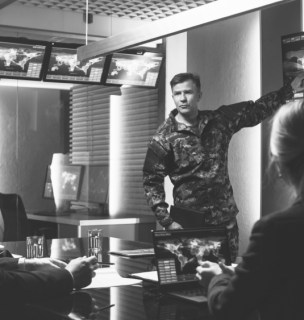
What is a MPA in Geopolitics of Conflicts and Crises?
A MPA in Geopolitics of Conflicts and Crises is a specialized level 7 postgraduate program that provides an in-depth knowledge in the study of conflict, crisis management and resolution, and civil war, with a geopolitical approach of concrete cases studies. The evolution of diplomatic relations, the global political landscape, the emergence of new forms of conflicts and crises, has led CEDS to imagine new graduating programs specialized in these issues.
Over the course of an academic year, the students are taught the multifaceted approach to conflicts through natural resources dispute, competition for political power in given countries, and territorial claims. Led by experts, these programs give everyone the opportunity to gain expertise on high-stakes international and geopolitical conflict related issues
This program is taught in English.
Why a MPA in Geopolitics of Conflicts and Crises?
To gain an advanced knowledge on the study of global geopolitical crisis and on crisis management (dynamics, actors, solutions leading to peace, negotiation strategy, institutional reform, transitional justice, security and confidence building), and develop the appropriate skills to study the concrete geopolitical dynamics.
The Courses provided by the MPA in Geopolitics of Conflicts and Crises
1- SPECIALIZED COURSES
Identities, Frontiers and Regional Conflicts
The border demarcation is a process that was supported by the formation of modern states. As for the newborn states in the former European colonies and protectorates in Africa and the Middle East, the territorial claims went alongside with the development of the new forms of state and nation building and are in many cases highly conflictual. The course focuses on the geopolitical approach to the link between identities formation and territorial disputes, based on many concrete cases studies.
Natural Resources Related Conflicts
The course presents a geopolitical global landscape about different types of natural resources, their location, their control, their trade etc., before focusing on the conflicts resulting from the scramble to control and exploit them. Many specific cases are taught that highlight the interaction between local, regional, and international political players on a given resource-rich area. The course combines a global approach to the flow of natural resources and a geographically localized approach to specific interactions and conflicts.
Geopolitics of the Elections Related Conflicts and Crises
The course finds its “raison d’être” in all the political crises resulting from conflicting claims to political power during a transition to democracy. This gives the opportunity through the cases studies to determine the conditions that can secure fair elections and build confidence among the antagonistic political forces.
Geopolitics of Peace Building
The course combines the theories of conflict resolution and peace building with the concrete cases of many African and Latin American societies moving from civil war to civil peace and reconstruction. The study of peace building is multidimensional as it mobilizes beside the political settlements, the economic, the judicial and the cultural dimensions, ,therefore combining the economy of peace with culture of peace and transitional justice.
2- FUNDAMENTAL WORKSHOPS
Workshop in Geopolitics
The purposes of the workshop are summarized as follows :
Enabling the student to exploit and use the knowledge provided in the fundamental courses in geopolitics and geostrategy
Developing the methodological skills in geopolitics, through a better knowledge of the method of analysis related to the geopolitical issues
Applying the concepts and doctrine to specific areas of conflicts and crises adapted to the concerns of the students.
Developing a synthetic approach and a critical thinking through the research papers and presentations required
Workshop in Research Methodology
It is dedicated to the scientific research processes in the social sciences, in international relations, diplomacy, geostrategy and geopolitics. It presents the methods used in the development of hypotheses and in the use of information or observation data. It specifically addresses the method of writing the dissertation itself.
3- FUNDAMENTAL COURSES
Geopolitics of the developing world : the case of Africa
This is a pluridisciplinary course combining the development related economic problematics with the geopolitical approach of the developing countries’ position inside the global system.
The course focuses on the African continent and spells its diversity in economic as well as in political terms. It is mainly dedicated to paradoxes: the paradox of a rising continent that is still the target of the planetary and regional powers’ ambitions, the coexistence, in a similar sub-region of countries with a solid economic growth and of devastated countries, as well as many others. The integrative dimension through the African Union and the subregional organizations is also worth to be studied.
Geopolitics and Geostrategy of the Great Powers
The very nature of an international/or/global political system relies on the balance of force between the leading global powers. As the world system moved from a bipolar system to a unipolar, then to the present system qualified a multipolar by some and as non-polar by others, the course emphasizes a presentation of:
- the capabilities of each of the great powers, in addition to the political structure and dynamics
- the foreign policies in their changing doctrines and strategies for each of the considered powers
- their influence on the global geostrategic landscape
Geopolitics of the Sea and Maritime Strategies
The control of the sea seems to be one of the key issues as far as the national economies are dependent on foreign trade and shipments of commodities and manufactured goods, on international movements of population and on the access to strategic locations.
The course combines a historical approach starting with the development of political geography and the emergence of sear powers, with an updated presentation of the key present issues at stake, stressing out the type of control exerted by each of the planetary and regional powers.
Each of those powers has its own maritime strategy to control the key location in the seas, oceans, and straights, or at least to balance the expansion and the hegemonic strategy of competing or antagonistic powers.
Expected skills and knowledge

Enable auditors to combine a theoretical approach and practical expertise in their understanding of conflicts and crises

Provide them with an indepth theoretical and empirical knowledge about concrete cases in their geopolitical context
The MPA in Geopolitics of Conflicts and Crises Year in Review
The program runs for one year. The courses are adapted to the professional constraints of executives in terms of time volume and schedule.
The courses are scheduled on a weekly basis for four months, giving priority to two afternoons (Thursday and Friday, 4:15-8:30 p.m.) as much as possible, and spreading some courses over three intensive weeks.
The next intake is expected for late November 2024


The MPA in Geopolitics of Conflicts and Crises Research Thesis
The student completes the program with the presentation and defense of a MPA research thesis under the supervision of a CEDS professor. The research thesis is the essential step of the training, as it provides a specialized knowledge on a specific research topic related to crises, conflicts, peace building or any other related issue of the student’s choice.
Prerequisites to apply for the MPA in Geopolitics of Conflicts and Crises
A Master 1 level degree is required, as well as four years of professional experience as an executive


Conditions of access to the MPA in Geopolitics of Conflicts and Crises
To enter the program, the auditor must complete an application.
Skills developed and opportunities offered by a MPA in Geopolitics of Conflicts and Crises curriculum
- Develop the expertise in studying conflicts and crises, and to display an ability to mobilize advanced knowledge and skills in exploiting the theories and concepts to provide appropriate cases studies.
- Contribute to the research centers and foundations dedicated to the study of conflicts and crises.
- Support the sectoral approaches in the public administrations and international organizations by a multidisciplinary insight of the geopolitical specific dynamics in a given area.

The tuition fees
| Nationals or Residents in France | International candidates |
|---|---|
| 10400€ | 10890€ |
Practical information about the MPA Conflict Resolution
Support for a successful curriuculm
Once enrolled, the auditors receive pedagogical documents and information.
They have the opportunity to get in touch with the professors and experts and to interact with them.
They also have the possibility to choose the research topic that is the most suitable to their concerns, areas of interest or professional ambitions, within the limits of the specialization they are enrolled for.
A supervisor is appointed since the middle of the year to guide them and provide the appropriate methodological advises

Stakeholders
Most of our lecturers are specialized profeessors and professional experts.

Campus
Classes are held at :
10 Sextius Michel
75015 Paris
France

Accessibility
The premises are accessible to disabled persons.

Updated 15 April 2025







